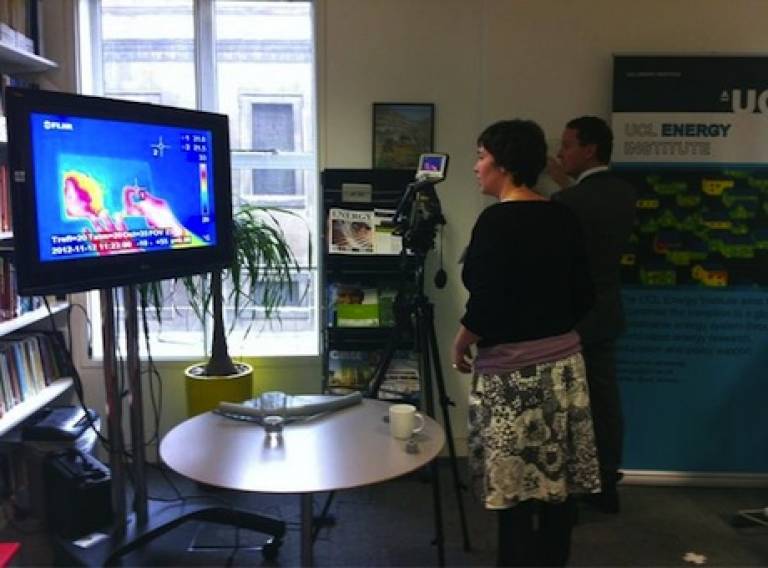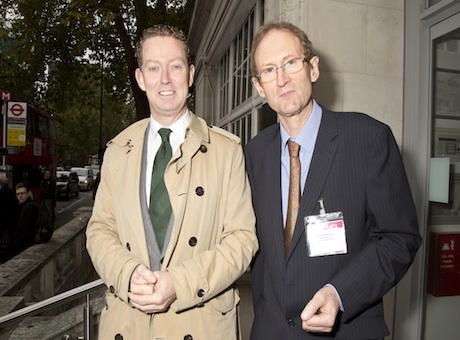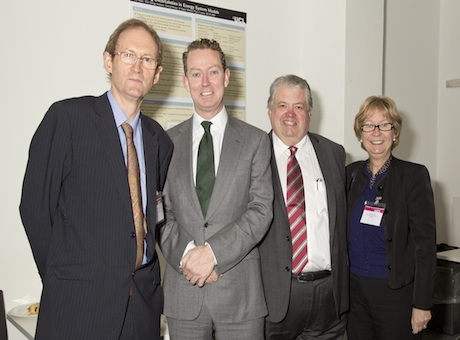Energy Minister announces £39 million investment in research during visit to UCL-Energy
12 November 2012

The UCL Energy Institute hosted the Energy and Climate Change Minister for the announcement of a £39 million investment in research to support energy efficiency policy and contribute to cutting carbon use and greenhouse gas emissions today (Monday 12 November 2012).
The Rt Hon. Gregory Barker MP announced the funding for five new End Use Energy Demand (EUED) research centres, of which the UCL Energy Institute is the only centre based in London. The centres will look into the complexities of energy use across society and bring valuable insight into how energy can be both saved and used more efficiently.
The Minister said:
“We have now put energy efficiency at the very heart of the Government’s energy policy. Using energy more wisely is absolutely vital in a world of increased pressure on resources and rising prices. Not only can energy efficiency help save money on bills and cut emissions, it can support green jobs, innovation and enterprise.
“The five new End Use Energy Demand centres launched today will play an important role in improving our understanding of how energy is used across the nation, helping us learn more about what needs to be done to change consumer and business behaviour. I wish these centres every success and look forward to seeing the results.”
During the visit to the UCL Energy Institute, the Minister was greeted by Professor Bob Lowe, Deputy Director of the UCL Energy Institute, Catherine Coates, Director of Business Innovation, EPSRC, and David Price, Vice Provost of Research at UCL, for a one hour tour of the Institute. The visit involved the minister meeting representatives from the UCL Energy Institute's successful proposal, the RCUK Centre for Energy Epidemiology, and watching four UCL Energy Institute PhD students demonstrate pieces of kit they use for research.
Professor Bob Lowe, Deputy Director at the UCL Energy Institute said:
“EPSRC's decision, announced at UCL this morning, to fund five Energy End Use Demand Centres represents a step change in public support for energy demand research in the UK, reflecting the fact that energy efficiency has moved to the periphery to the very heart of the Government’s energy policy.
My colleagues and I feel privileged to be able to take part in this initiative. We intend, through our Centre for Energy Epidemiology, to transform the nature of energy demand research over the coming 5 years."
The five centres are to receive over £26 million funding from two research councils, the Engineering and Physical Sciences Research Council (EPSRC) and the Economic and Social Research Council (ESRC), and a further £13 million from industrial partners. The funding is one of the Research Council's biggest investments.

The RCUK Centre for Energy Epidemiology
The main goal of the UCL Energy Institute’s successful bid the RCUK Centre for Energy Epidemiology will be to provide an evidence base for government and industry. The centre will use novel, UK developed, approaches to ‘Energy Epidemiology’ to maximise the value of existing and very large future sources of energy-related data ('big data'), ensuring the greatest impact for evidence-based energy demand research.
The largest impact will be in creating accountability for multi-£bn investments in energy efficiency in the UK. This will help meet long term carbon emission, energy security and fuel poverty targets, and help ensure that policies such as Green Deal and Energy Company Obligation deliver value for money.
The UCL Energy Institute will partner with industry for the RCUK Centre for Energy Epidemiology. The partners are: Transport KTN, Intel Corporation, University of Ibadan, Committee on Climate Change,The National Energy Foundation, Johnson Controls Ltd, Energy Technologies Institute, Cambridge Architectural Research Ltd, Arup Group Ltd, FuturICT, PassivSystems Limited, Aedas, University of Wollongong, Wilmott Dixon Services Ltd, The Energy Saving Trust Ltd., National Physical Laboratory NPL, EDF, Technical University of Lisbon, CIBSE.

Links within the UCL Energy Institute website:
Images:
Top: Charlie Morris-Marsham, PhD student at UCL Energy Institute shows Gregory Barker MP demonstrates how an infra red camera works - copyright Ellie Jones, UCL Energy Institute
Middle: Greg Barker MP meets Professor Bob Lowe, Deputy Director of UCL Energy Institute, on the steps of Central House - copyright - Mary Hinkley, UCL Media Services
Bottom: (L-R) Professor Bob Lowe, UCL Energy Institute, Greg Barker MP, David Price, Vice Provost, UCL Research, Catherine Coates, EPSRC -copyright - Mary Hinkley, UCL Media Services
Quote: The Minister's quote was kindly supplied by DECC
 Close
Close

